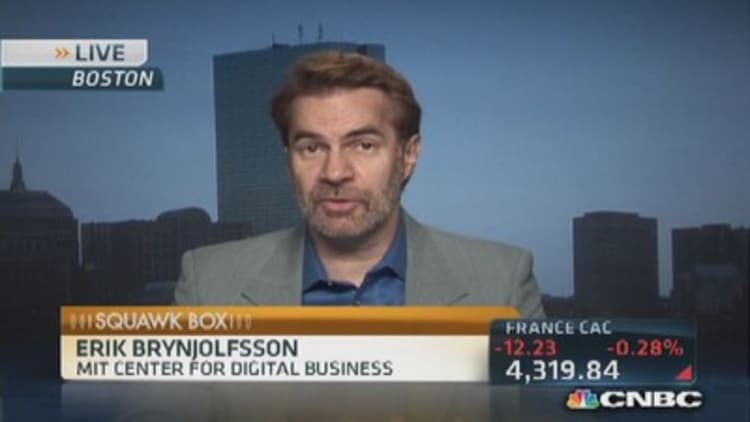Americans are working longer hours and working later into life than ever before, so it's not surprising that almost 60 percent of Americans feel vacation-deprived, according to Expedia's 2013 Vacation Deprivation study. And even when they are getting some R&R on the beach, 67 percent of vacationers said they stay connected remotely to the office, checking email and voice mail regularly.
The Expedia study, now in its thirteenth year, examined the work-life habits of 24 countries and found that America's work habits most closely resemble that of Asian countries, where workers average more than 48 hours a week, according to the most recent data available from the Organization of Economic Cooperation and Development.
Although the Expedia study found that 76 percent of America's bosses support vacation plans, employees use only 10 out of every 14 vacation days each year. That means that of the roughly 144 million Americans employed in the U.S., more than 500 million workdays are left unused. The study also found that 35 percent of respondents frequently need to cancel or postpone vacations due to work-related issues.
A heavy workload is not only to blame for unused work time, however. In some states vacation time is considered compensation. So if an employee accrues paid time off, companies are required to compensate them when they leave. In the Expedia survey, 17 percent of Americans who did not use vacation days said the reason was a preference to "cash out" with their unused days. For this reason, many employees opt to stockpile them.
A new way to vacation
The number of vacation days an employee receives is usually based on years of service. According to the latest data from the Bureau of Labor Statistics, 10 days of paid vacation is given after one year of service; 15 to 19 days are given after 10 years; 20 to 24 days after 20 years, and so on.
But it seems this traditional approach to paid time off isn't working.
In an effort to encourage employees to take their vacation so they can be more productive when in the office, some companies have instituted a new vacation concept: unlimited paid time off. Referred to as "endless summer" by some companies, it typically combines vacation, sick and personal days without any set limit. Yes, that's right. There's no catch; it's truly unlimited.
(Read more: )
Although some notable companies have already embraced the idea, claiming that it is a move toward a more self-autonomous philosophy in the workplace and ultimately makes workers more productive, it's too early to call the concept a trend—The Society for Human Resource Management (SHRM) found that only 1 percent of companies are offering unlimited paid time off. But those that do are happy with the results.
Take Netflix, for example. According to company spokesman Jonathan Friedland, "people appreciate the flexibility and do a good job of balancing their vacation time with those of others and the work we all aim to get done."
Dan Price, founder and CEO of Gravity Payments, a company based in Seattle, Wash., that provides credit card processing services to independent businesses, agreed. "The idea is that you are now judging employees on their work and results," he said.
(Read more: Paid time off: Use it or lose it)
Price, who is also a member of the YPO Chief Executive Network (CNBC and the Young Presidents' Organization have an exclusive editorial partnership), began the company's unlimited paid-time-off policy less than a year ago, and so far results have been favorable. "The outcome of this policy is likely to make staff more productive in work and in their personal lives," he said.
Price points to one positive example from his company. "We have an employee whose mother continues to battle cancer. ... The unlimited PTO policy has allowed this employee to not spend time worrying about squirreling away vacation days, or the perception of having to risk his work reputation." Lack of worry and less time spent fretting over needed time off improves worker efficiency, Price explained.
Although many companies may worry that employees would take advantage of the unlimited-time-off policy, Bruce Elliott, manager of compensation and benefits for SHRM, said that most workers are afraid that taking too much time off could damage their reputation. "What we see in some cases is a portion of the population taking less time," he said, explaining that workers worry they are taking more time than colleagues. More often than not, Elliott said, workers take about the same amount of time off as those employees who are offered traditional paid-time-off benefits.

Good for the bottom line
Companies are claiming a financial win from these unlimited-time-off policies, too. Days off are not being accrued, and if an employee leaves, a company doesn't have to pay them out for unused days. It also means that companies don't have to put that expense on their books.
"It bleeds off a liability on a company's profit-and-loss statement," Elliott said, adding, "It helps on the bottom line."
Start-ups are expected to be among the companies to make or break this trend. As they look to raise financing or pursue an initial public offering, they need to show their top and bottom line to investors: It helps not to have paid time off on their books, Elliott said.
"We don't have to track vacation time and keep money in reserve for bean-counting reasons," said Maggie Leung, director of content for the San Francisco, Calif.-based personal finance start-up NerdWallet, which has been offering unlimited paid time off since the company started in 2009. Speaking as an employee, she added, "It's amazing to not have to juggle, beg, borrow or steal to take time off that you've earned as a professional."
(Read more: Can wearable tech boost business productivity?)
Improving productivity by way of unlimited time off does pose some legal risks for companies.
For instance, if an employee is abusive of the time-off policy, it is more difficult for a business to use truancy as cause for termination, since the company offers this unlimited perk. "Depending on the state, like California, it can expose a company to some level of liability," Elliott said.
That's why offering unlimited time away from the office works best for professionals with clear performance metrics—such as sales employees who have to meet dollar quotas.
"It's possible to do this at Netflix because our staff is under 2,000 people and largely constituted of mid-career engineers, scientists and executives," Friedland said.
The simplest way to safeguard against abuse: to caveat unlimited paid time off pending a supervisor's approval to ensure that goals and deadlines are met.
For Price, at least so far, the experience has been quite the opposite, he said. Supervisors have had to sit employees down, telling them, "You need to take three or four weeks off."
—By Anthony Volastro, Segment Producer, CNBC. Follow him on Twitter @VolastroCNBC.




